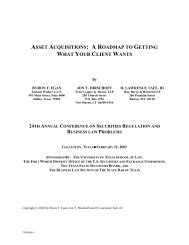fiduciary duty issues in m&a transactions - Jackson Walker LLP
fiduciary duty issues in m&a transactions - Jackson Walker LLP
fiduciary duty issues in m&a transactions - Jackson Walker LLP
You also want an ePaper? Increase the reach of your titles
YUMPU automatically turns print PDFs into web optimized ePapers that Google loves.
of the corporation, and <strong>in</strong> a manner that is not know<strong>in</strong>gly unlawful or contrary to public policy.While the Court’s review requires it to exam<strong>in</strong>e the Board’s subjective motivation, the Court willutilize objective facts to <strong>in</strong>fer such motivation. Like a <strong>duty</strong> of care analysis, such review likelywill focus on the process by which the Board reached the decision under review. Consistent withearlier articulations of the level of conduct necessary to <strong>in</strong>fer bad faith (or irrationality), morerecent case law suggests that only fairly egregious conduct (such as a know<strong>in</strong>g and deliberate<strong>in</strong>difference to a potential risk of harm to the corporation) will rise to the level of “bad faith.” 60“Waste” constitutes “bad faith,” but director liability for waste requires proof that thedirectors approved an “exchange that is so one sided that no bus<strong>in</strong>ess person of ord<strong>in</strong>ary, soundjudgment could conclude that the corporation has received adequate consideration.” 61 Waste is aderivative claim. 62The impetus for an <strong>in</strong>creased focus on the <strong>duty</strong> of good faith is the availability ofdamages as a remedy aga<strong>in</strong>st directors who are found to have acted <strong>in</strong> bad faith. DGCL§ 102(b)(7) authorizes corporations to <strong>in</strong>clude <strong>in</strong> their certificates of <strong>in</strong>corporation a provisionelim<strong>in</strong>at<strong>in</strong>g or limit<strong>in</strong>g directors’ liability for breaches of the <strong>fiduciary</strong> <strong>duty</strong> of care. However,DGCL § 102(b)(7) also expressly provides that directors cannot be protected from liability foreither actions not taken <strong>in</strong> good faith or breaches of the <strong>duty</strong> of loyalty. 63 A f<strong>in</strong>d<strong>in</strong>g of a lack ofgood faith has profound significance for directors not only because they may not be exculpatedfrom liability for such conduct, but also because a prerequisite to eligibility for <strong>in</strong>demnificationunder DGCL § 145 of the DGCL is that the directors who were unsuccessful <strong>in</strong> their litigationnevertheless must demonstrate that they have acted “<strong>in</strong> good faith and <strong>in</strong> a manner the personreasonably believed was <strong>in</strong> or not opposed to the best <strong>in</strong>terests of the corporation.” 64Accord<strong>in</strong>gly, a director who has breached the <strong>duty</strong> of good faith not only is exposed to personalliability, but also may not be able to seek <strong>in</strong>demnification from the corporation for any judgmentobta<strong>in</strong>ed aga<strong>in</strong>st her or for expenses <strong>in</strong>curred (unsuccessfully) litigat<strong>in</strong>g the issue of liability. 65Thus, <strong>in</strong> cases <strong>in</strong>volv<strong>in</strong>g decisions made by directors who are dis<strong>in</strong>terested and <strong>in</strong>dependent withrespect to a transaction (and, therefore, the <strong>duty</strong> of loyalty is not implicated), the <strong>duty</strong> of goodfaith still provides an avenue for assert<strong>in</strong>g claims of personal liability aga<strong>in</strong>st the directors.606162636465In re the Walt Disney Company Derivative Litigation, 906 A.2d 27 (Del. 2006).In Re Citigroup Inc. Shareholder Derivative Litigation, C.A. No. 3338-CC, 2009 WL 448192 (Del. Ch. Feb. 24, 2009).Thornton v. Bernard Technologies, Inc., C.A. No. 962-VCN (Del. Ch. February 20, 2009) (“When a director engages<strong>in</strong> self-deal<strong>in</strong>g or commits waste, he takes from the corporate treasury and any recovery would flow directly back <strong>in</strong>tothe corporate treasury.”)Specifically, DGCL § 102(b)(7) authorizes the <strong>in</strong>clusion <strong>in</strong> a certificate of <strong>in</strong>corporation of:A provision elim<strong>in</strong>at<strong>in</strong>g or limit<strong>in</strong>g the personal liability of a director to the corporation or itsstockholders for monetary damages for breach of <strong>fiduciary</strong> <strong>duty</strong> as a director, provided that suchprovision shall not elim<strong>in</strong>ate or limit the liability or a director: (i) For any breach of the director’s <strong>duty</strong>of loyalty to the corporation or its stockholders; (ii) for acts or omissions not <strong>in</strong> good faith or which<strong>in</strong>volve <strong>in</strong>tentional misconduct or a know<strong>in</strong>g violation of law; (iii) under §174 of this title [deal<strong>in</strong>g withthe unlawful payment of dividends or unlawful stock purchase or redemption]; or (iv) for anytransaction from which the director derived an improper personal benefit . . . .DGCL §§ 145(a)-(b).In contrast, it is at least theoretically possible that a director who has been found to have breached his or her <strong>duty</strong> of loyaltycould be found to have acted <strong>in</strong> good faith and, therefore, be eligible for <strong>in</strong>demnification of expenses (and, <strong>in</strong> non-derivativecases, amounts paid <strong>in</strong> judgment or settlement) by the corporation. See Blasius Industries, Inc. v. Atlas Corp., 564 A.2d651 (Del. Ch. 1988) (directors found to have acted <strong>in</strong> good faith but nevertheless breached their <strong>duty</strong> of loyalty).5446095v.114
















